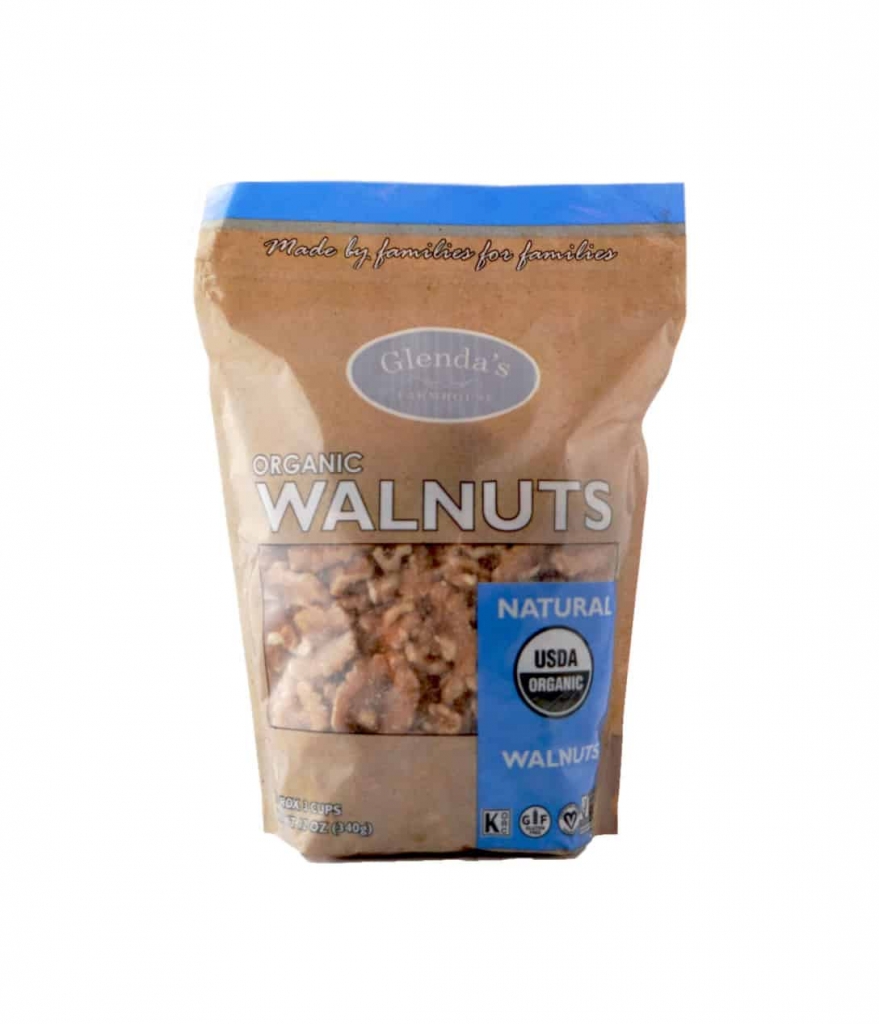Whether you just discovered the versatility and nutritiousness of walnuts or you routinely work walnuts into your diet, Glenda’s Farmhouse provides a convenient online source to find the best walnuts, and we have a bit of advice for keeping your inventory fresh and ready for use.
Andersen & Sons Shelling has farmed walnuts, prunes, and cattle since 1904, and Glenda’s Farmhouse is one of our brands. As a whole, we are among the top walnut producers in California, producing 50-70 million pounds of walnuts per year.
Following our merger with Western Nut Company, we are broadening into other brands and products, yet our commitment to providing quality walnuts remains. Glenda’s Farmhouse walnuts are certified organic by California Certified Organic Farmers (CCOF), non-GMO verified, gluten-free, kosher, and certified vegan.
Regular Use of Walnuts in the Kitchen
Walnuts should be a staple of every kitchen. Packed with protein and healthy fats, they are a nutrient-dense ingredient or anytime snack. They’re easy to throw into dessert batter or casserole ingredients for depth of flavor and nutrition, or just as quickly can be sprinkled atop salads or yogurt or just eaten by the handful.
The high amount of Omega-3 essential fatty acids is one of the key hallmarks of walnut nutrition, but the high-fat content can lower the shelf life of walnuts kept in the pantry. We suggest checking your walnut stash regularly to ensure you have fresh walnuts on hand at all times.
Evaluating Shelled Walnuts
First, perform a visual inspection to evaluate your stash of shelled walnuts. If they appear rubbery or dried out, throw those away. Then, perform a tactile inspection. If they feel soft or moist, the walnuts are no longer good. Finally, use your sense of smell and taste. Quality, fresh walnuts have a nutty smell and taste, but ones that have turned will have a chemical smell and bitter taste.
Evaluating Unshelled Walnuts
If you keep unshelled, whole walnuts on hand, you’ll still need to evaluate them before use. Start by holding them. Good walnuts will feel full, and bad ones will rattle because the walnut within the shell is dried out. You can also look them over for any cracks or holes. Exposure to air will have damaged the walnuts within the shell. Finally, you can put your walnuts inside a bowl of water. The ones that sink are good, and the ones that float aren’t.
Best Practices for Walnut Storage
Smart storage of walnuts will help keep your stock fresh. Walnuts should always be kept in the refrigerator: shelled walnuts have a fridge life of a month; unshelled walnuts will remain fresh in the refrigerator for up to half a year. Store your walnuts in an airtight freezer bag in the freezer for a year-long shelf life.
Which Is Better to Buy: Shelled or Unshelled Walnuts?
If your decision is based on nutrition alone, it will be impossible to choose because the nutritional values are the same, shelled or not.
Unshelled walnuts do have an extra layer of protection that shelled walnuts lack. They’re also generally cheaper to purchase and can have a fresher taste if enjoyed as opened.
On the other hand, shelled walnuts provide convenience, and it’s easier to evaluate their quality visually.
Walnuts are one of the best ingredients to keep on hand for a snack or a dish, and Glenda’s Farmhouse makes it simple to order them online or by calling (530) 839-2236.




